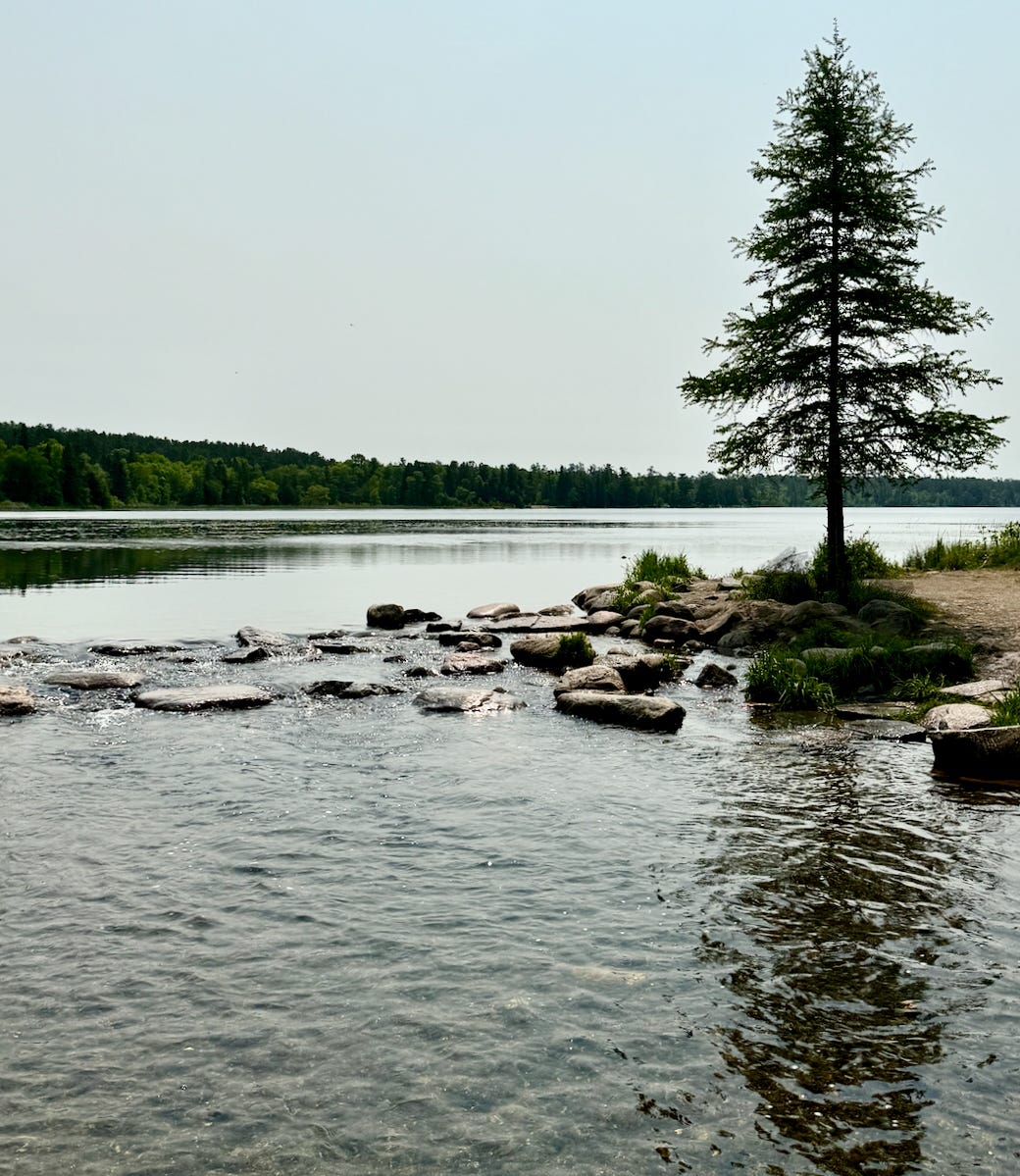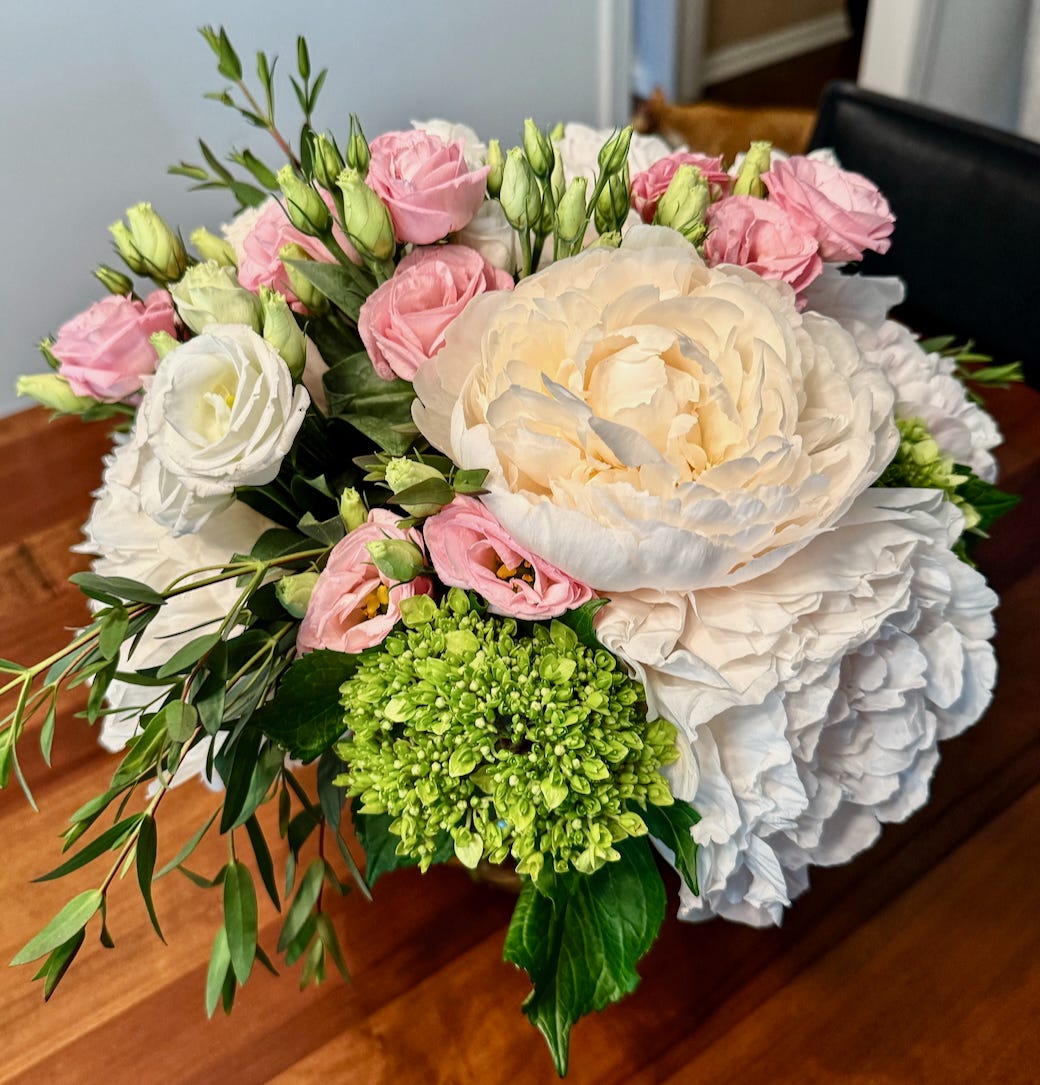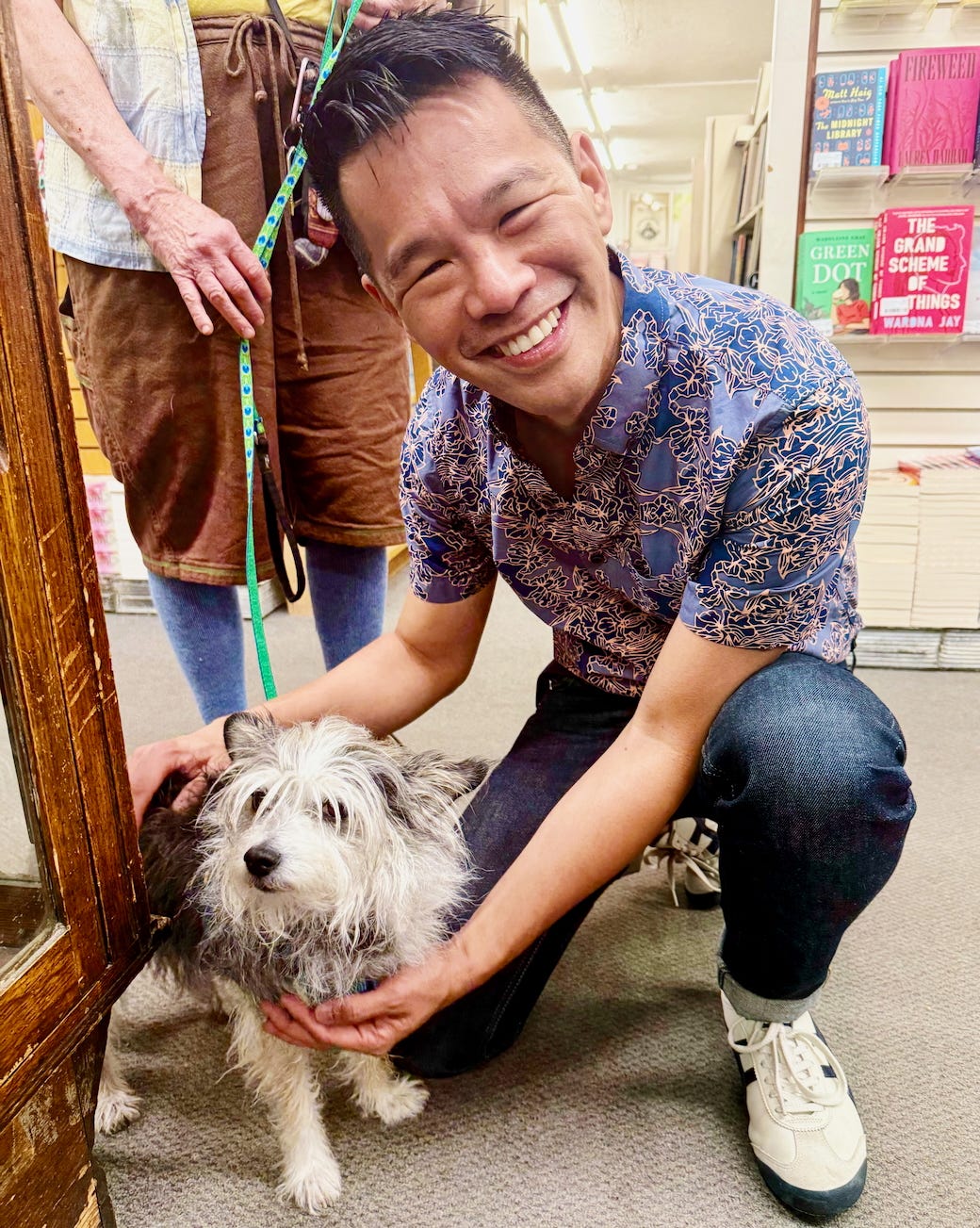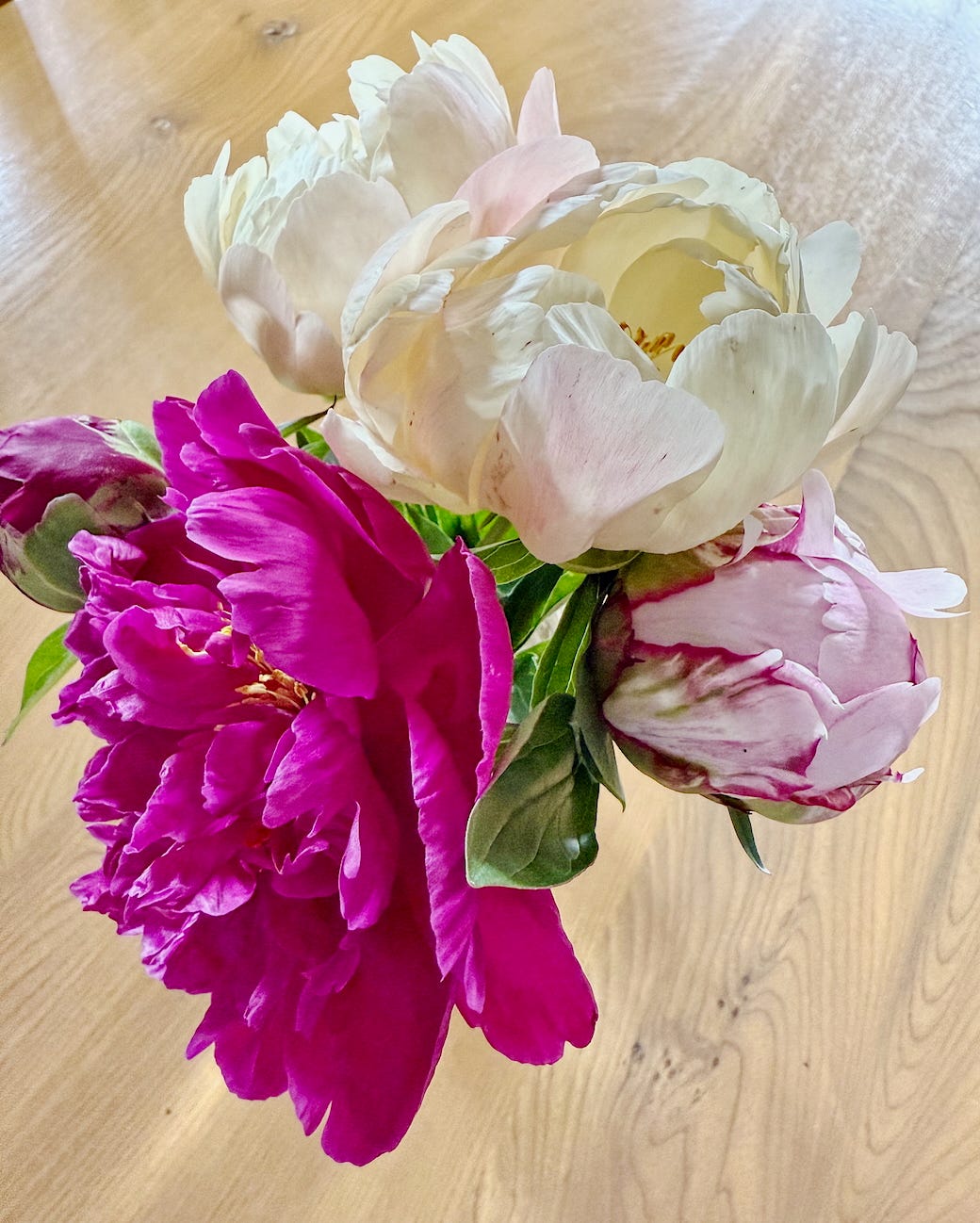Pieces of Hope
Some fragmented thoughts on hope, souvenirs from the road, and heroic healing work
Thursday, June 5
Grand Rapids, Mich.
It’s smoky here in West Michigan today, as it was last weekend in Minnesota, when I was driving all over that state. The haze, carried from the Canadian prairies and boreal forests now ablaze, attests to our interdependence. Everything is connected.
Everywhere I’ve gone, I’ve gotten variations on one question: What message do you have for us in this moment? Sometimes it’s couched in existential terms: How do we keep going? Often it’s framed around hope: What hope can you offer us right now?
My answer to that core question is the same, for better and for worse: Everything is connected. Any fragment of hope I have to offer is borrowed from someone or something else.
If there’s one thing I learned at the Farminary, it’s that the evidence of death is all around us all the time. But signs of hope are too. I find hope in the rising of the sun each day. It’s in the persistence of nature—the perseverance of the groundhog that would not be denied access to the garden’s buffet, the steady labor of the bees, the resolute journeys of the migratory geese. It’s in the renewal—the slow, steady, can’t-be-rushed renewal—of the compost pile; there, we’re invited to acknowledge and surrender the things of death as well as to recognize the resurrection work accomplished in near-miraculous community.

On Saturday, I was due in the town of Park Rapids, some three hours drive north of the Twin Cities, by 1 p.m. But I left Minneapolis early, so that I could drive a bit further north, to visit the headwaters of the Mississippi River. I don’t know what I was expecting, but it wasn’t what I found: little more than a stream, just a few feet across, easily crossed by a collection of rocks. I stood by the water for a long while, and then I followed the path along the little river’s bank. In places, the channel was so narrow that it felt as if I could almost jump across. Even the mighty Mississippi has small beginnings. Then, as it makes its way slowly toward the south, it gathers force and strength from other waters—and if that isn’t a good and necessary word for us right now, I don’t know what is.
After the book event, which was lovely, I met Rachel and Tim Oberg, a couple who moved from the Berkshires four years ago to run the Park Theater, an art-deco movie house in town. They’re doing their best to keep a community gathering place going, even as they dismantle drop ceilings and strip layers of old paint, uncover original details and imagine innovative programming. Low in financial returns but high in heart profit, their painstaking work testifies to the challenge of holding old and new in delicate balance, respecting tradition while iterating toward new possibility.
When I got back to my friend Sharon’s house that evening, I sat for a few minutes regarding a vase of flowers that she’d bought for my room. Sharon is a gifted storyteller, and this lavish bouquet told a story of hospitality. There, amidst the lisianthus, which I mention in Good Soil as being one of my favorite flowers, as well as gorgeous peonies, each bloom almost as big as my face, was evidence of the particular grace of being known with specificity.
I went upstairs to find Sharon’s cat, Sherman. I don’t like cats, I am not a cat person, and I don’t think I’ll ever be a cat person, but I am a Sherman person. As I scratched behind his ears and he craned his neck to nudge my fingers into just the right spots, he reminded me that, despite our bigotries, openheartedness can and will reward us.
The next morning, I preached at Gloria Dei, my friend Jodi’s church in St. Paul. The highlight of worship wasn’t my sermon. A few years ago, Gloria Dei turned an unused classroom into temporary living quarters designated for refugees. For the past several months, it has hosted a family of asylum seekers from South America. This past Sunday, ahead of their asylum hearing next week, the family moved into their own apartment. During the worship service, the congregation gathered around the couple and their son, laid hands on them, pledged to be with them at that hearing, and prayed for their journey ahead.
Then, on Monday afternoon, I popped into Mosaic Coffee Company, a cafe in Minneapolis that opened just a few months ago. I met Jimmy Tidmore, one of the proprietors, years ago, at our denominational synod. He was a college student and I was a voting delegate. That synod was a tough one, marked by harsh recrimination and no small amount of pain. I’ll never forget how he came to me, after I went up to the microphone a couple of times, to offer gently fierce encouragement and exhortation. Our paths have gone in different directions since—I finished seminary, he chose not to—yet standing in Mosaic Coffee’s gorgeous space, it struck me that pastoral gifts can be deployed in so many distinct ways, including the creation of a place where people can gather and find not just good coffee but also some belonging.
A few hours later, it was time for my book event at the legendary Magers & Quinn, which happens to be right next door to Mosaic Coffee. One of the first attendees I met that evening was named Flynn. The first dog to have attended one of my events, Flynn was such a good boy, attentive and quiet. As I gave him one last pet at the end of the night, his wiry hair felt me so much like that of our late Fozz, and for a few seconds, I felt the fullness of both grief and gratitude.
My conversation partner on Monday evening was Chris Stedman, a brilliant professor, author, and multimedia storyteller whom I’ve known for over a decade. He’s an atheist; I’m obviously not. We went to dinner afterward (at the spectacular Gai Noi—highly recommend) along with his lovely fiance, Eric. I won’t divulge any of what we discussed, but I will say that Chris models integrity, care, and healthy vulnerability.
When I got home, I went out into the yard to cut some peonies. I’ve waited years for these peonies—years since my mother sent the roots from her own garden for me to plant in mine. The first year and then the second, we had no blooms; last year, just a few. This year, though: three on one plant, four on the next, six and eight and ten on still others. I felt my way through, looking for that marshmallowy ripeness. I harvested one or two flowers, but most of them told me to wait a while longer.
We scavenge for hope. Like magpies, we follow and watch, grabbing a little here and tucking a bit away there. Much as I might—we might—wish for some magic spell, some all-transformative moment, that sends evil scurrying and rights every wrong, what we have instead are fragments of good and scraps of grace. Somehow, though, hope is always there. And much like the fishes and loaves, hope does a miraculous thing in attentive, generous community. It replicates. Somehow, there’s always enough to be shared.
Where have you found a hint of hope lately? I’d love to know.
A note of grief: This morning, an Israeli military strike hit Ahli Arab Hospital in Gaza City, killing five people, including three local journalists and a father who had brought his son to the hospital for surgery. This is only the latest in a long series of attacks on the hospital. On Palm Sunday, another strike destroyed the hospital’s ER, lab, and pharmacy.
One of the last remaining functioning medical facilities in northern Gaza, Ahli Arab Hospital has persevered in its vital work. Its heroic staff has continued to labor amid horrific conditions to help and to heal. St. Philip’s Chapel, on the hospital grounds, has been converted into a makeshift ward.
If you’d like to join me in supporting the hospital’s work, donations can be made via the American Friends of the Episcopal Diocese of Jerusalem. Make sure to choose “Ahli Arab Hospital” on the dropdown menu to direct your donation appropriately. Thanks for considering.
Coming soon: Starting June 16, I’ll be in Pennsylvania: Monday in Willow Street, Tuesday in York, Wednesday in Chambersburg, Thursday in Lancaster, and Sunday in Philadelphia. In York, I’ll be in conversation with Byron Borger of Hearts & Minds Bookstore. Ahead of that event, Byron wrote a lovely reflection about Good Soil. You can find all the details and links with information and registration for those events at byjeffchu.com/tour.
Thanks, as always, for walking alongside me through all this. Remember that you can always reach me by email at makebelievefarmer@gmail.com or by old-fashioned mail at P.O. Box 68565, Grand Rapids, MI, 49516. It’s always a delight to hear from readers.
With gratitude and in hope,
Jeff








Checking in from Manitoba, where the wildfires and smoke continue... I feel tears prick my eyes each morning as I drink my coffee and read more stories in the newspaper of the devastation and the pain of 17,000 evacuated folks, losing their homes and so much more... But I have hope in seeing folks in my city and province, coming together to do their best to care for them and serve them in beautiful ways.
Pray for us when you smell that smoke.
Thanks for your words, "Much as I might—we might—wish for some magic spell, some all-transformative moment, that sends evil scurrying and rights every wrong, what we have instead are fragments of good and scraps of grace. Somehow, though, hope is always there." They are the reminder I need this week.
Thanks for this piece Jeff. Re. what gives me hope: I like to think about how, as our eyes slowly adjust to darkness, they become more able to make out points of light. It's a powerful metaphor I think, and tells us why we should resist the temptation to bury our heads in the sand during dark times.
Oh and I love the sentiment in this song: https://www.youtube.com/watch?v=VOS7OiLE11c&list=RDVOS7OiLE11c&start_radio=1